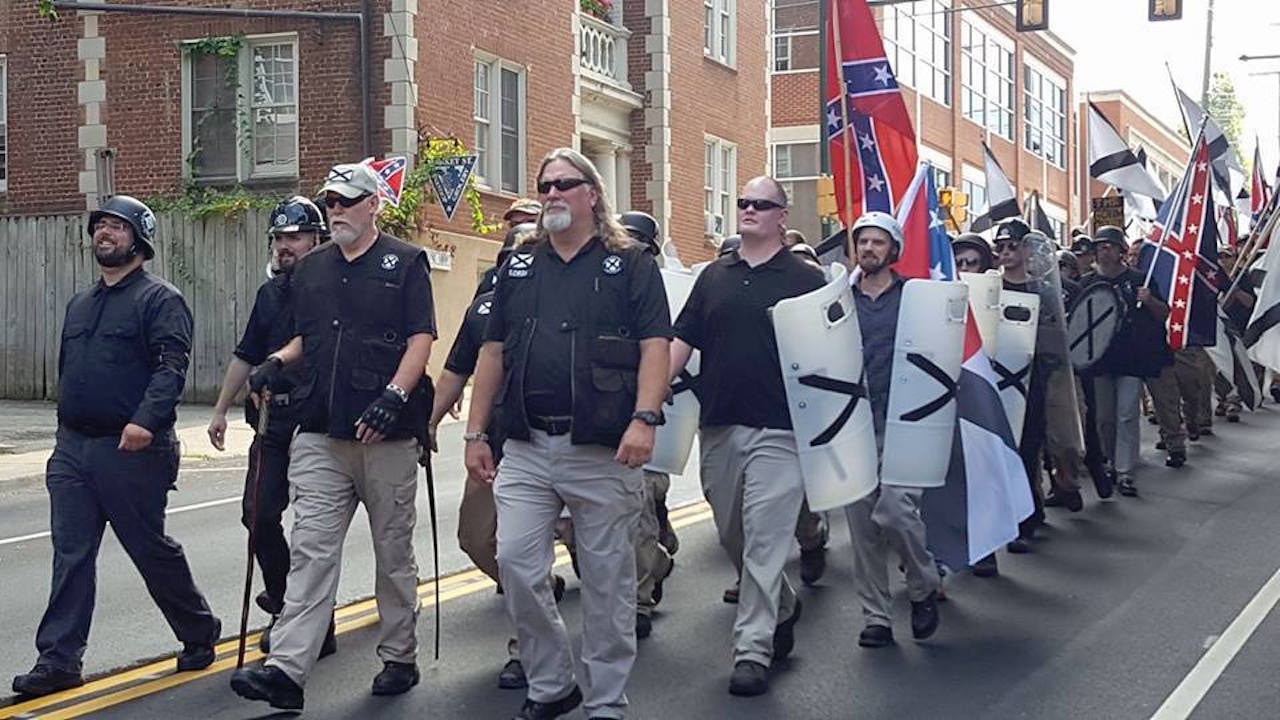A recent Southern Poverty Law Center article covering tension within the League of the South brought to mind Douglas Wilson’s connections to that neo-confenderate, white supremacist organization. As long as I’m thinking about it, I might as well offer your regular reminder that Wilson co-wrote a booklet defending antebellum slavery with Steve Wilkins, co-founder of the League of the South, a white nationalist organization that has increasing ne-Nazi tendencies and participated in the violence at last summer’s “Unite the Right” rally at Charlottesville.
Wilson is an evangelical pastor who calls himself a “paleo-confederate” and has multiple times urged judges to show leniency to child molesters who were studying at his (unaccredited) seminary in Moscow, Idaho, when they were found out. He has called for the banishment or execution of LGBTQ individuals and is an ardent supporter of a patriarchal order in the home and in society, launching sexist diatribes at women who dare step outside of carefully defined religious gender roles.
Wilson oversees his own Christian school association—his local school celebrates Robert E. Lee’s birthday but not Abraham Lincoln’s—and publishes history and literature textbooks that are used by Christian schools and homeschoolers around the country. (Wilson is listed as an editor of John Dwyer’s revisionist text, The War Between the States: America’s Uncivil War, which glorifies men like R. L. Dabney, a white supremacist who defended slavery and opposed public schools on the grounds that it was unjust “to raise taxes to give a pretended education to the brats of black paupers” on the backs of oppressed whites.)
I would not write about Wilson if he were not still widely acclaimed and supported in mainstream evangelical circles by figures like John Piper, and organizations like The Gospel Coalition. Wilson ought to be kept at arms length and disavowed, but, by and large, he is not. Instead, Wilson is accepted, included, and treated as a creative intellectual luminary and stalwart by evangelical leaders. This gives a false impression to evangelical laypeople that Wilson’s work is approved and worth reading and following, and that, frankly, is dangerous.
This is wrong. It is beyond wrong. By not condemning Wilson, evangelical leaders are complicit in the promotion of Southern apologist teachings and beliefs. And if you don’t think Wilson’s works actually change evangelical laypeople’s minds on these issues, think again. They do. I have personally seen it happen. What else would you expect, when otherwise well-meaning Christian homeschooling families use Wilson’s history and literature textbooks or other materials in their homes and homeschools, assuming that these materials are sound because Wilson is well respected among evangelical leaders?
In the late 1990s, Wilson co-wrote a book defending southern slavery with Steve Wilkins, the co-founder of the League of the South. In their book, Wilson and Wilkins portrayed African Americans as inherently lazy, and southern slavery as inherently beneficial, even Christian. Wilkins, acting on these beliefs, co-founded The League of the South with Michael Hill. The League of the South participated in a funeral in 1995 at which Hill, referring to African Americans, spoke of “elicit rights bestowed on a compliant and deadly underclass that now fulfills a role similar to that of Hitler’s brown-shirted street thugs in the 1930s.”
When Wilson co-wrote his book with Wilkins, Wilkins was on the League of the South’s board of directors. He would have been aware of language like that above, and aware that League members were advocating against creating African Americans Studies programs at universities in the South with arguments like: “If blacks have done anything worthy of study (and I cannot imagine what that would be), then work it into a regular class. … Lets face the truth. Blacks did not invent … anything of note anywhere in the world. … When blacks beat my LSAT score and earn a spot in law school, I’ll quit being racist.” And still, Wilkins remained on the board.
And Wilson, who now calls himself a “paleo-conservative” and continues to argue that the antebellum South was the last truly Christian nation of the West, co-wrote a book with him praising the institution of slavery as practiced in the antebellum South. And this man still has a platform in mainstream evangelicalism. Think about that for a moment. Think about the priorities that suggests. Think about the damage that does.
Many evangelicals today declare themselves “colorblind” and decry racism. They wonder why more African Americans do not attend their churches, as though their churches don’t have a long history of white evangelical racism to contend with—nearly all white evangelicals in the South, along with many white evangelicals in the North, opposed desegregation and questioned or opposed the civil rights movement—and as though their leaders and their churches don’t continue to cite and praise and host individuals who even today defend the South and glorify prominent nineteenth century white supremacists like Robert E. Lee or R. L. Dabney. There is no excuse for this sort of blindness.
The League of the South has never hidden its racial animas and white supremacy. In 2003, Michael Hill, by then president of the League, wrote a racial diatribe explaining the organization’s goals:
No less a man than Rev. Robert Lewis Dabney noted over a century ago that Southern whites recognized an obligation to treat Christian blacks (slave and free) as brothers in Christ, and to recognize their common humanity (original sin, all created in God’s image, etc.). …
This does not mean, however, that we must subscribe to the flawed Jacobin notion of egalitarianism, nor does it mean that white Southerners should give control over their civilization and its institutions to another race, whether it be native blacks or Hispanic immigrants. Nowhere, outside of liberal dogma, is any nation called upon to commit cultural and ethnic suicide. Furthermore, our surrender would ultimately be regretted by all parties as the remaining liberties were squandered by those who had no desire to preserve the Eurocentric, (and therefore “racist”), institution of the rule of law.
Let us in the League, then, confidently defend our ethnic, cultural, and religious heritage. …
But at the same time, we will loudly proclaim that we will have no truck with those who wish to interject malice and hatred into the racial issue, and that includes both sides, black and white. Being proud and thankful of who we are does not mean that we must denigrate others. But let us always speak the truth about race (as well as all other things) no matter how uncomfortable it may be or how politically incorrect it is.
For instance, League member and syndicated columnist Charley Reese noted in a recent column that black-on-white crime has reached epidemic proportions (e.g. 100 white rapes against blacks in 1994 as compared to over 20,000 black rapes against whites). Reese writes: “This huge disparity between white-on-black and black-on-white crime is the elephant at the tea party that both the press and the federal government pretend they can’t see. They are vile hypocrites.” Well said, Charley.
Such hypocrisy is guaranteed to fuel white resentment, but we must not allow ourselves to be pulled into the vortex of hatred and violence to “settle the score.” Rather, we should speak the unvarnished truth and continue to work positively for the interests of our own people. And of course this means protecting ourselves when necessary, individually and collectively.
Today’s white Christian Southerners are the blood descendants of the men and women who settled this country and gave us the blessings of freedom and prosperity. To give away this inheritance in the name of “equality” or “fairness” would be unconscionable. As the progeny of Lee, Jackson, Forrest, and Davis, let us summon the courage to defend what the God of the ages has given us. No one else will do it for us.
Hill states that whites must defend their culture and their way of life and gives lip service to speaking against racial animus, but then says that whites must tell it like it is, and repeats the age-old canard that black men rape white women in large numbers—a falsehood used to defend decades of horrific lynching. That, apparently, is what calling it like it is looks like—spreading racial hate, for Hill, is merely truth-telling, not racism.
Perhaps you’re wondering whether, after writing his book with Wilkins, Wilson disavowed the League of the South, or proclaimed loudly that he was not affiliated with it. That is not what happened. In 2004, a year after Hill penned the racial diatribe above, Wilson was asked to clarify his relationship with the League of the South. He offered an answer to this question:
Now I am not a member of the League, and Steve has recently resigned from the board of directors because his priorities have been shifting. But let me say this to support the League (mildly), even though I do differ with them. I am not a member of the League because I believe that the severe problems this nation has do not admit of a political or cultural solution. There is no way out for us apart from a massive reformation of liturgy and doctrine in the evangelical church nationwide. That is where I want to concentrate all my energies, and that is what I understand Steve as also wanting to do. I believe that the League’s attempts to stop what is happening are in the same category as the attempts being made by Focus on the Family to get prayer back in the government schools.
…
As for the folks in the League of the South and Focus on the Family, God bless them. I wish them the best, and I understand why they want to get out there and make a direct challenge to the abortion culture, the homosexual culture, and so forth. But they will continue to fail because so many Christians still refuse to acknowledge Christ’s ownership of their babies, refuse to bring them up in the nurture and admonition of the Lord, refuse to teach them the glories of celebrating the Lord’s Day, and refuse to conduct their worship services as though our triune God is holy, holy, holy.
The folks in the League are good diagnosticians. But they are not in a position to pursue the remedy, which will only be found if judgment begins with the household of God.
Wilson put The League of the South in the same category with Focus on the Family—both, he argued, were trying to solve well-attested cultural problems, but because only church-based liturgical change would fix these problems, each organization was ultimately doomed to fail. Remember that Wilson wrote this about the League of the South after a solid decade of racist language. The League has never hidden its racial positions; they have always been front and center.
I do not understand how Wilson has a platform anywhere but his own personal blog. I do not understand how evangelicals have tolerated him—and promoted him—for so long. The League of the South, whom he wished the best, marched at Charlottesville last summer, and actively participated in the violence there.

This was always a racist hate group. It was founded as a racist hate group. Wilson did not care. This is not surprising, I suppose, given that Wilson co-authored a book portraying antebellum slavery as good for blacks, and the antebellum South as the quintessential Christian nation. Wilson has spent the two decades since the publishing of Southern Slavery As It Was claiming that he is not a racist. White evangelical leaders across the country have taken Wilson at his word, even as he has gone on calling himself a “paleo-confederate” and calling the antebellum South the last nation of true Christendom. As far as I am concerned, they are complicit.
Wilson explained his views as follows, in a 1998 book:
When the Confederate States of America surrendered at Appomattox, the last nation of the older order fell. So, because historians like to have set dates on which to hang their hats, we may say the first Christendom died there, in 1865. The American South was the last nation of the first Christendom.
A decade after publishing Southern Slavery As It Was—which plagiarized boldly and at length from a widely discredited book published decades earlier (not Wilson’s only run-in with plagiarism, by the way)—Wilson was interviewed for Christianity Today about his views on race. As the 2009 article, which I have read previously, is behind a paywall, let me offer a summary published by Americans United:
Wilson, who refers to himself as a “paleo-Confederate,” seems unrepentant, telling Christianity Today that he believes “the South was right on all the essential constitutional and cultural issues surrounding the war.”
“You’re not going to scare me away from the word Confederate like you just said ‘Boo!'” Wilson told the magazine. “I would define a neo-Confederate as someone who thinks we are still fighting that war. Instead, I would say we’re fighting in a long war, and that [the Civil War] was one battle that we lost.”
Wilson says if fundamentalists admit the Bible’s approval of slavery is outdated, their scripture-based attacks on abortion, feminism and homosexuality might be considered outdated too.
Wilson repeated the above framing in a 2011 interview and has never to my knowledge backed away from it. Indeed, in the linked interview, Wilson claimed that racial animus in the U.S. (note that he did not use the word racism) was the result of waging a war to end slavery rather than following Paul’s dictates on slavery—as though there was no racism in the U.S. before the Civil War, as though chattel slavery were not based and grounded in racism.
According to Wilson, the South was a truly Christian society. The North was pagan and godless. When the South fell, Christianity fell, and all modern evils in the United States stem from that moment. Wilson continues to champion white supremacist leaders of the antebellum period, Civil War, and Jim Crow era. None of this has changed.
Several years ago, Gospel Coalition blogger Thabiti Anyabwile participated in a blog exchange with Wilson, publishing a debate over Wilson’s views on race. The conversation centered on whether Wilson’s book Black and Tan, published nearly a decade after Southern Slavery As It Was, mended the damage done by his previous book (Wilson has often told those scrutinizing his defense of slavery to read Black and Tan). While Anyabwile sought to find bridges across their difference and wrote that he considered Wilson a brother in Christ, he was unable to get Wilson to budge on a his core stances surrounding the South and slavery.
I’m left wondering—why did white evangelical leaders leave it up to one of the few African Americans among them to bring up or challenge in any way Wilson’s views on race? Talk about putting someone in a tough spot. It is hard enough to be a black evangelical in a white evangelical world without also being expected to be the one to stand up and say something when white evangelicals embrace a “paleo-confederate.”
I have yet to see a conservative or mainstream evangelical leader condemn Doug Wilson. We’re talking about a man who collaborated with the founder of a white supremacist society on a book that portrayed slavery as idyllic; a man who spent years defending a white supremacist organization as well meaning and right on essentials. From time to time, evangelical leaders question whether Wilson has his theology right, but this centers on an obscure debate over “federal vision” theology and not Wilson’s views on race, which white evangelical leaders seem to universally ignore.
And evangelicals wonder why so many people believe they have a problem with race.
I have a Patreon! Please support my writing!















